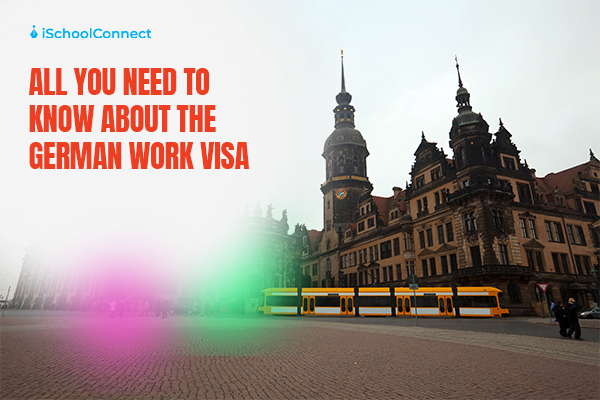Table of Contents
With one of the lowest unemployment rates in Europe, there is a wide range of job options, and countless opportunities to advance professionally and gain experience. Many internationals aspire to work in Germany and benefit from the good pay and work-life balance that the country provides.
However, taking the first step is equally important. Check out all you need to know about how to get a German work visa.
Germany work visa eligibility

Getting a German work visa depends on your citizenship or nationality. While certain countries are exempt from the need to get a visa, the process is different for some countries. You must satisfy certain conditions to apply for a German work visa.
The following are the important eligibility requirements to obtain a German visa:
- Work experience in a related subject of at least 5 years.
- The money you’ll need for your 6-month stay.
- Obtain travel or medical insurance that will cover you for the duration of your visit.
- Citizens from the following country do not need a visa
- EU/EEA
- Australia
- Canada
- Israel
- Japan
- The Republic of Korea,
- New Zealand
- Switzerland
- USA
Germany work visa requirements
You need the following documents to obtain a German work visa:
- Two application forms have been completed, printed, and signed.
- Your valid passport, as well as three identical passport-format pictures that meet biometric requirements.
- Proof of accommodation.
- Proof of travel health insurance is necessary. You should be able to show proof of health insurance.
- The DR-WALTER PRO VISIT VISUM travel health insurance plan satisfies all German immigration authorities’ visa criteria.
- Financial proof is essential. You should show that you have enough money to meet your costs for the period of your stay by providing a bank statement.
- “Verpflichtungserklärung” – A letter of commitment/declaration from someone stating that you will be reimbursed for your costs.
- A bank account has been blocked.
- Curriculum Vitae (CV)- It includes a complete education and work history.
- Evidence of one’s position.
- Proof of academic achievement.
- Payment of the Visa charge confirmation.
Prerequisites for getting a German work visa

Recognition of your qualifications by German authorities:
When applying for jobs in Germany, you must not only provide proof of your professional and educational qualifications but also acknowledge your professional abilities by German authorities. This is especially important for professions such as physicians, nurses, and teachers.
Knowledge of German:
You will have an advantage over other job searchers if you have some knowledge of the language. If you have the relevant educational credentials, work experience, and a basic understanding of German, you will have an excellent chance of finding work here (B2 or C1 levels). However, knowledge of German is not essential for professional vocations such as research and development.
Language requirements
You do not need IELTS in Germany for employment.
On the other hand, the English language requirements may vary depending on the job. You will need to be fluent in English if your employment requires you to travel to other nations.
While having a basic grasp of German will improve your job prospects.
Where and how to apply
After entering Germany without a visa, nationals of the United States of America, Australia, Canada, Israel, Japan, New Zealand, Switzerland, the Republic of Korea, and EU residents may apply for a work permit. However, if employment is to begin immediately after arriving in Germany, a visa (which includes the work permit) must be obtained in advance, since it is not permissible to begin working in Germany without first obtaining the required work permit.
Citizens of other countries must apply for and receive a work visa at the German Embassy in Washington, the Consulate Generals in Atlanta, Boston, Chicago, Houston, Los Angeles, Miami, New York, or San Francisco before admission.
How to apply for a German work visa?

Below are the important steps in the Germany work visa Application:
- Complete the German work visa application form
- Book a visa interview appointment
- Compile all the required documents for the visa
- Attend the interview at the nearest embassy or consulate
- Pay the German work visa fees
The outcome of your interview at the German embassy will determine whether or not you will be granted a German Worker Visa.
Keep in mind that you won’t be allowed to work in Germany if you have a work visa. You can apply for a resident visa or a German work permit if you can find work in Germany.
After acquiring your Germany visa, prepare a solid CV and an outstanding application letter to help you find work. Start making connections and networking with future jobs as well.
What we have to say
- For German firms, looking for professionals out of the EU is a wonderful way to locate the talents they need to prosper.
- Non-EU nationals have found it simpler to get employment permits in recent years. The procedure, however, can be complicated and outside the scope of many in-house HR departments.
- By enlisting the expertise of global mobility professionals, businesses may save time and money.
Liked the blog? Comment below and share your thoughts with us!
Liked this blog? Read next: 11 best countries to study abroad and work in 2022
FAQ’s
Q1. What is the EU Blue Card?
Answer – The EU Blue Card, often known as the EU Blue Card, is a residency permit for non-EU academics who seek to work in an EU Member State. Applicants seeking an EU Blue Card must have a university degree as well as a job contract that meets the minimum gross wage criterion.
Q2. How much does a German visa cost?
Answer – A German visa costs €75 for long-stay visas. The Short-stay visas (under 3 months) cost €60.
Q3. What is the Germany work visa processing time?
Answer – German visas take around 6–12 weeks to be processed from the time of an interview with the German consulate. This means you should start the process of your visa application around 4–5 months before your trip to Germany.






